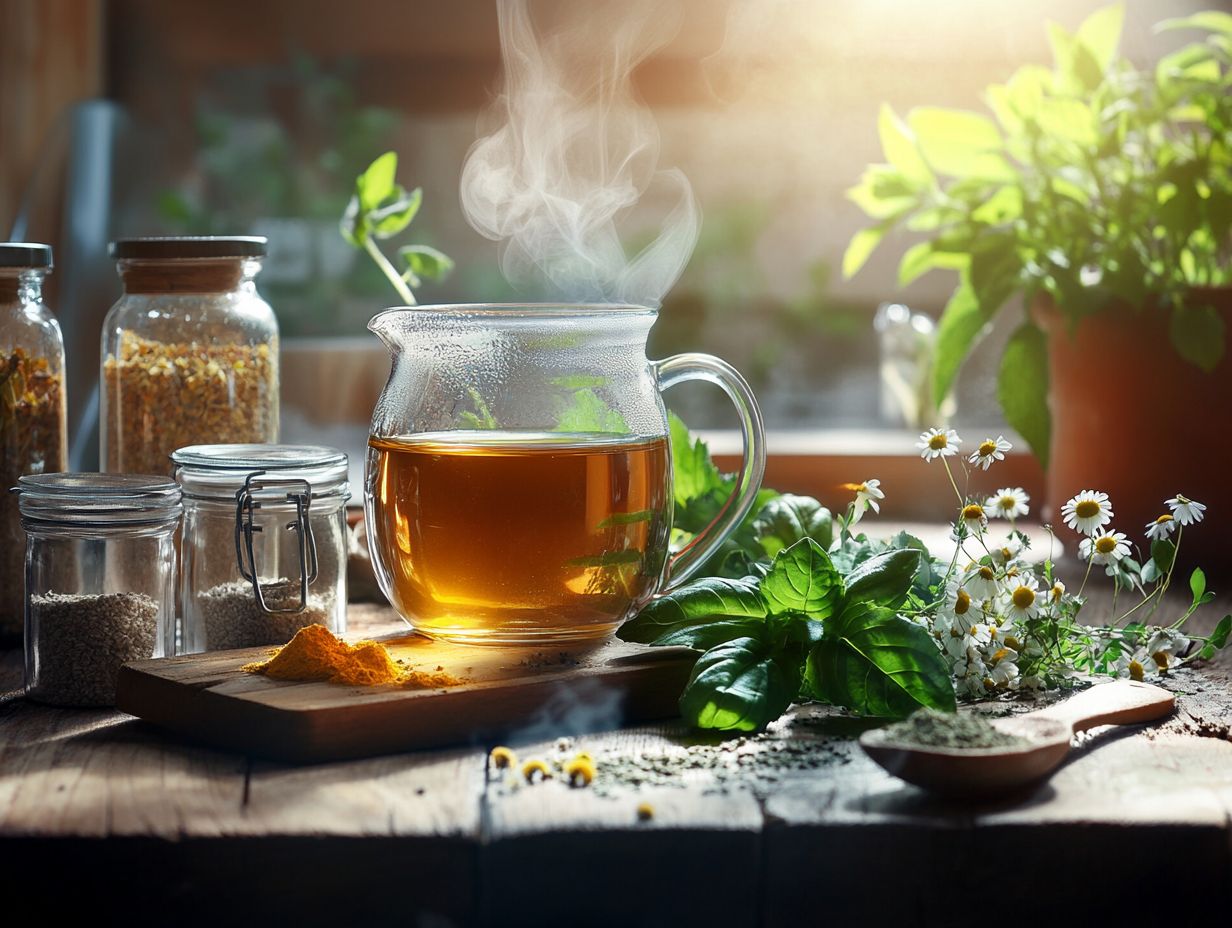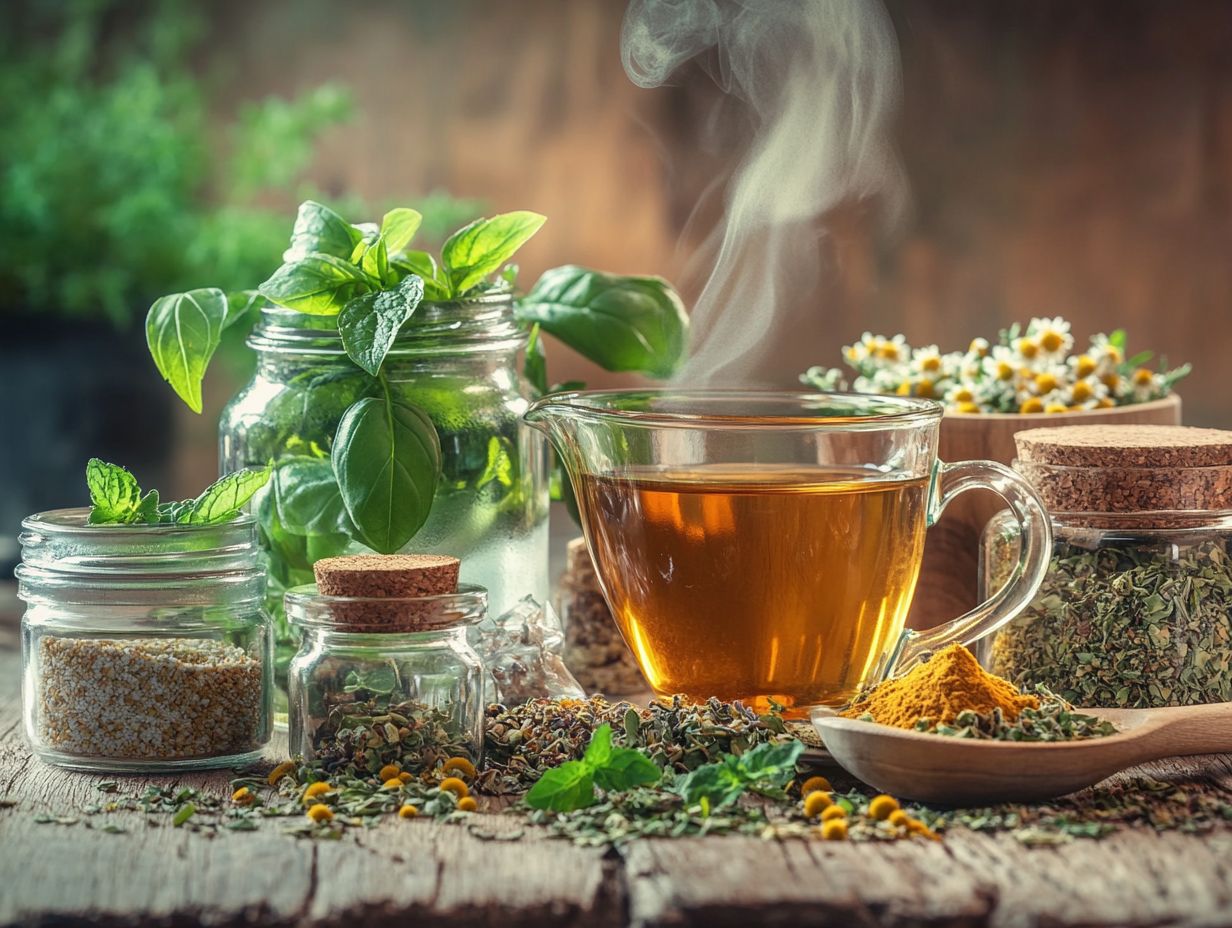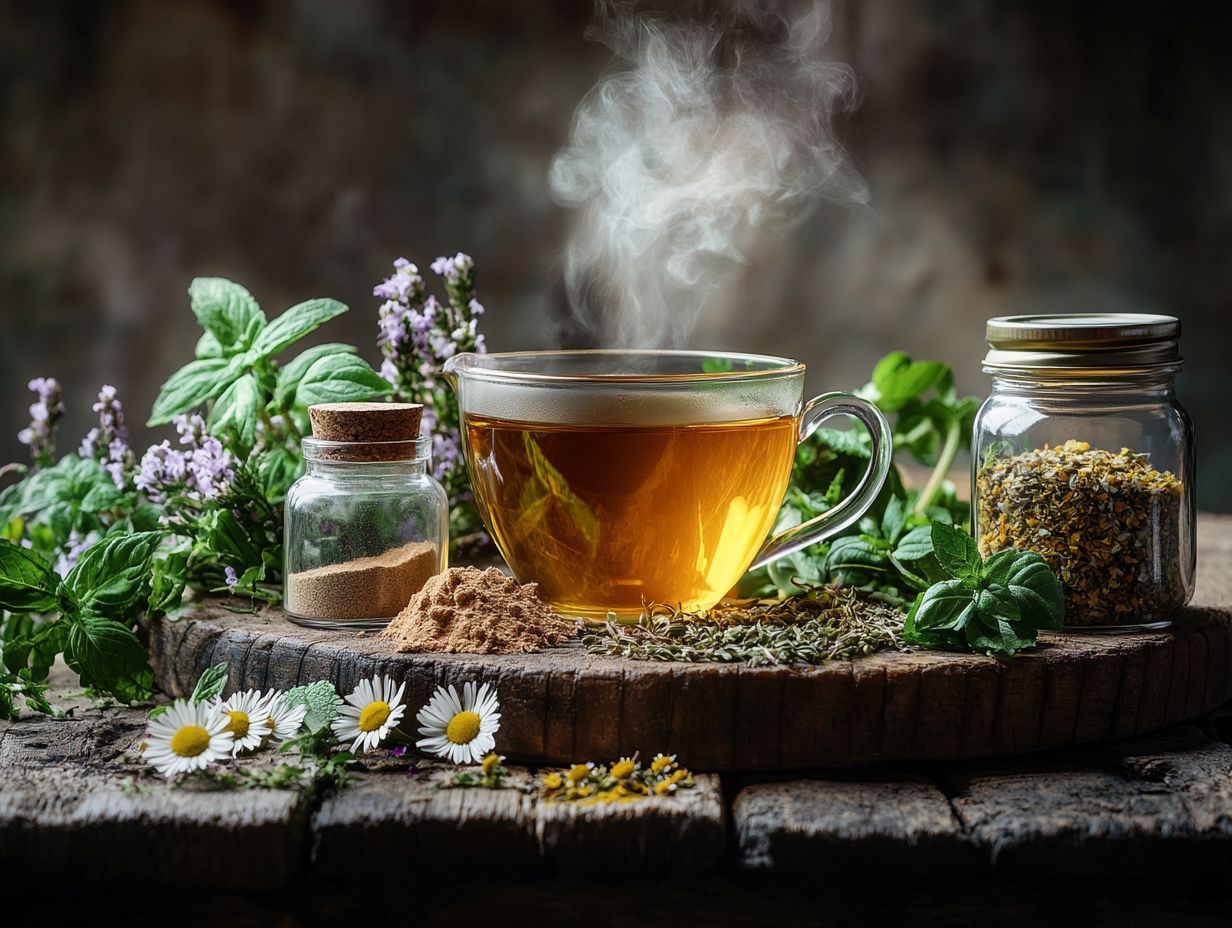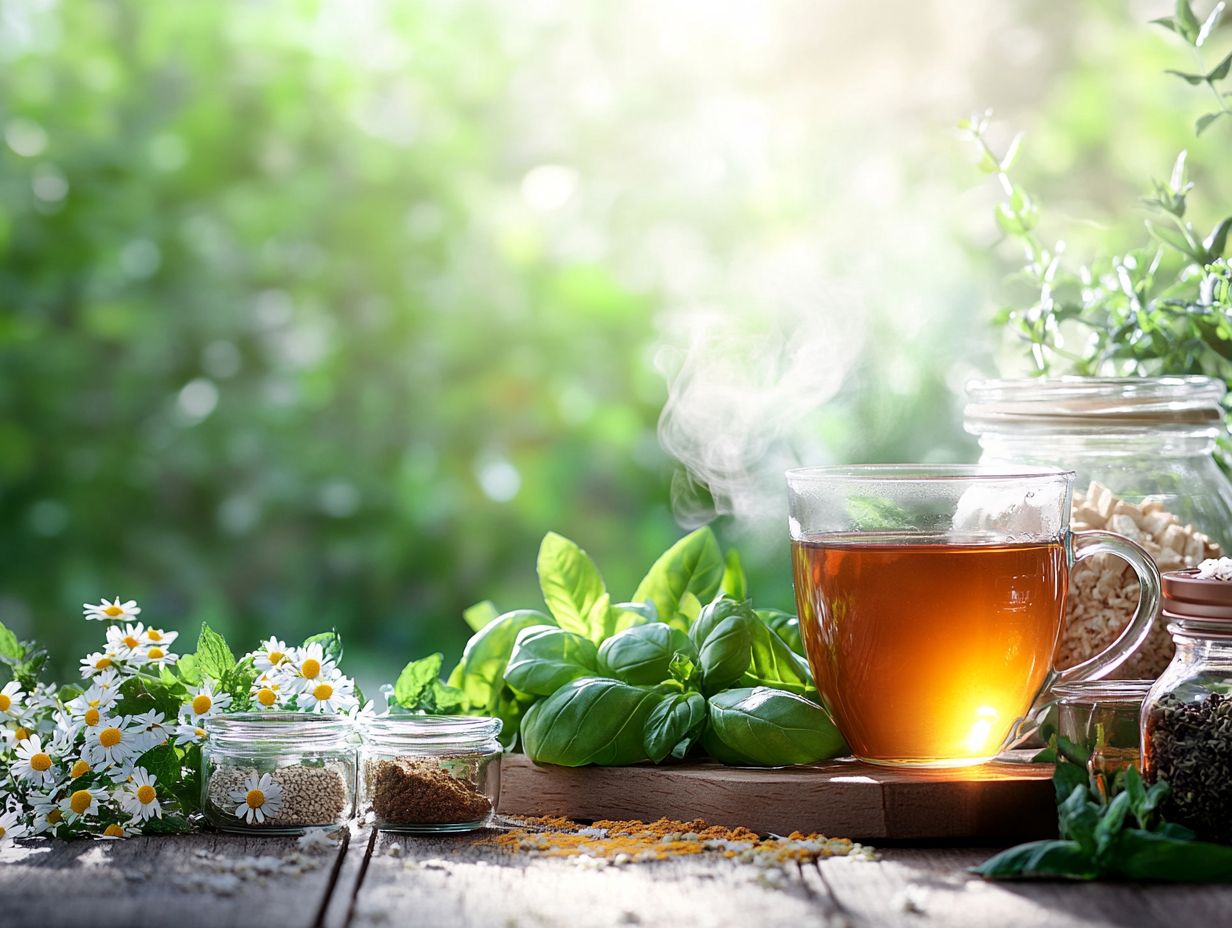What Are the Most Popular Herbal Remedies?
Herbal remedies have stood the test of time as a fundamental aspect of natural healing. They provide a holistic approach to health and wellness that resonates deeply with many.
From calming teas to powerful tinctures, these plant-based solutions tap into the richness of nature. They tackle a wide range of ailments.
Explore the benefits of herbal remedies, the commonly used plants, and ways to include them in your daily life.
You’ll also delve into popular remedies and any potential side effects. This empowers you to make informed choices that align with your health goals.
Contents
Key Takeaways:

Herbal remedies are natural healing options made from plants and herbs, offering a variety of benefits for overall health and wellness.
Popular herbal remedies include ginger, turmeric, and garlic. These have been used for centuries for their healing properties.
While herbal remedies can offer many benefits, it’s important to use them safely and follow proper guidelines to avoid potential side effects and interactions with other medications.
What are Herbal Remedies?
Herbal remedies represent a time-honored tradition that utilizes the power of medicinal plants and various herbal products to enhance your health and well-being.
Drawing from centuries of wisdom in herbal medicine, these remedies are often your go-to for addressing minor ailments like the common cold.
Consider popular options such as:
- Echinacea for immune support
- Ginkgo biloba for sharpening cognitive function
- Ginger root for digestive wellness
Each illustrates the remarkable versatility of herbal treatments.
In both traditional and contemporary settings, herbal remedies hold a significant place in holistic health care approaches. They offer alternative treatment options and resonate with the rising desire for natural solutions.
Take turmeric, for instance; it s celebrated for its anti-inflammatory properties, making it a favorite among those seeking relief from chronic pain.
Likewise, chamomile has earned a reputation for its soothing effects, often used for alleviating anxiety and promoting restful sleep.
By incorporating these remedies into your daily wellness routine, you can tap into the healing power of nature, supporting your health in a balanced and sustainable way.
Benefits of Herbal Remedies
Herbal remedies present a wealth of health benefits, making them an appealing option for those seeking natural alternatives to conventional medicine.
They can bolster your immune system, diminish inflammation, and even alleviate symptoms tied to anxiety and stress.
Ingredients such as ginseng root and turmeric stand out for their remarkable properties, showcasing the effectiveness of these natural solutions in enhancing your overall wellness.
Natural Healing Properties
The natural healing properties of herbal remedies arise from the active compounds present in medicinal plants, embraced for centuries across various cultures.
Take Echinacea, for example it’s well-known for its immune-boosting prowess. Turmeric boasts remarkable anti-inflammatory and antioxidant benefits.
These herbs are rich in plant chemicals known for health benefits, such as alkaloids and flavonoids, which play a significant role in their therapeutic effects.
Echinacea has been scientifically validated to enhance white blood cell production, a vital component in combating infections.
Curcumin, the active compound in turmeric, not only mitigates inflammation but also boosts cognitive function by reducing oxidative stress.
By incorporating these herbal products into your lifestyle, you can harness the wisdom of traditional healing practices. This fosters a sense of holistic well-being in today’s fast-paced world.
Don’t miss out on the chance to use nature s best!
Types of Herbal Remedies

Discover a vast range of herbal remedies, each tailored for specific purposes and sourced from a variety of medicinal plants that nature generously provides.
These include herbal supplements available in multiple forms, such as capsules and tinctures. Herbal teas also offer a comforting way to enjoy the benefits of herbs.
For instance, Ginkgo biloba supports cognitive function, while elderberry helps with respiratory health. These examples show how diverse and effective herbal remedies can be.
Plants and Herbs Used in Remedies
Various plants and herbs are essential to herbal remedies. Each offers unique properties that enhance your health.
Take Ginseng, for example; it’s often your go-to for a natural energy boost.
Garlic is celebrated for its support of cardiovascular health.
Chamomile is a versatile herb that s perfect when you need a little calm in your life.
Peppermint shines in digestion, soothing stomach discomfort and relieving nausea.
Echinacea is your ally for boosting the immune system, especially during cold and flu season.
Ginger is famous for its anti-inflammatory benefits and its ability to ease digestive issues.
Lastly, Lavender has an enchanting aroma that promotes relaxation and encourages better sleep.
Each of these botanicals plays a vital role in supporting various aspects of your wellness, making them essential allies in herbal medicine.
How to Use Herbal Remedies Safely
To get the most out of herbal remedies, it’s crucial to use them safely. Familiarize yourself with the safety information related to each herbal supplement, as some herbs can cause side effects or interact with medications.
For example, while Ginkgo biloba can enhance circulation, it may also increase bleeding risk. This makes it vital for those on blood thinners to exercise caution.
Guidelines for Proper Usage
Proper usage of herbal remedies is crucial for safely harnessing their healing properties. Adhere to recommended dosages, understand potential side effects, and consult the safety information for each remedy.
You can enjoy ginger root herbal teas daily, but be mindful of the quantity to prevent gastrointestinal discomfort.
Your preparation methods can significantly impact the effectiveness of these remedies. Certain compounds are more easily absorbed in liquids compared to dried herbs. Start with lower dosages to see how your body responds, especially if you re managing specific health conditions.
Before adding herbal solutions to your routine, consulting healthcare professionals is essential, particularly if you are pregnant, nursing, or taking medication. Recognizing your unique health profile can help craft a more personalized approach that maximizes benefits while minimizing risks associated with herbal remedies.
Common Herbal Remedies

Here are some common herbal remedies that effectively tackle various health issues.
Echinacea stands out for its immune-boosting properties. St. John’s wort is often sought after for its mood-enhancing benefits.
Turmeric also has strong anti-inflammatory benefits, making it a favored option among those who appreciate the power of natural remedies.
Overview of Popular Remedies
Discover the power of popular remedies! Today s herbal medicine landscape features sought-after herbal options, each offering distinct health benefits tailored to your needs.
Echinacea is well-known for its ability to fend off colds. Ginkgo biloba is celebrated as an ally for enhanced cognitive function. Ginger, renowned for reducing swelling and pain, completes this esteemed lineup of herbal remedies.
These options reflect time-honored traditions and capture significant attention from the modern scientific community. Research supports Echinacea’s potential to shorten the duration of colds. Studies on Ginkgo biloba suggest it may help improve memory and focus. Meanwhile, ginger’s anti-inflammatory properties are being investigated, leading to its growing popularity in culinary and therapeutic realms.
Herbalists often advocate for these natural solutions to address specific ailments. This approach resonates with those seeking alternatives to conventional medications.
Potential Side Effects and Interactions
Understanding the potential side effects and interactions of herbal remedies is essential for anyone thinking about using them. These factors can greatly influence safety and effectiveness.
Take Ginkgo biloba, for instance. It’s celebrated for its cognitive benefits, but it can interact with anticoagulants, increasing the risk of bleeding. Therefore, having a thorough understanding of safety information is crucial to minimizing adverse effects.
Precautions to Take
Taking precautions when using herbal remedies is vital for ensuring a safe experience while maximizing their benefits.
Before you start a regimen of natural supplements, carefully consider potential interactions. Consulting with healthcare professionals who specialize in herbal medicine is highly advisable, as they can offer personalized insights tailored to your health history.
Thorough research on specific herbs is important to understand their uses, contraindications, and recommended dosages. You should be aware of how certain herbs may affect the effectiveness of your current medications or worsen preexisting health conditions.
With knowledgeable guidance, you can significantly enhance both the safety and effectiveness of your herbal remedy journey.
Frequently Asked Questions

What Are the Most Popular Herbal Remedies?
The most popular herbal remedies include echinacea, ginger, turmeric, garlic, ginkgo biloba, and peppermint.
What is Echinacea, and how can it help you?
Echinacea is a flowering plant commonly used to boost the immune system, reduce inflammation, and treat colds and flu.
How Can Ginger Be Used as an Herbal Remedy?
Ginger can be used fresh, dried, or in supplement form to help with nausea, vomiting, digestion, inflammation, and pain relief.
What is the Most Common Use for Turmeric as an Herbal Remedy?
Turmeric is often used as an anti-inflammatory and antioxidant. It has been shown to help with pain relief, joint health, and skin conditions.
What Are the Benefits of Using Garlic as an Herbal Remedy?
Garlic has been used for centuries to boost the immune system, lower blood pressure, and improve heart health. It also has anti-inflammatory and antibacterial properties.
Can Ginkgo Biloba Be Used to Improve Brain Function?
Yes, Ginkgo biloba has been shown to improve cognitive function, memory, and concentration. It is also commonly used to treat anxiety and depression.






